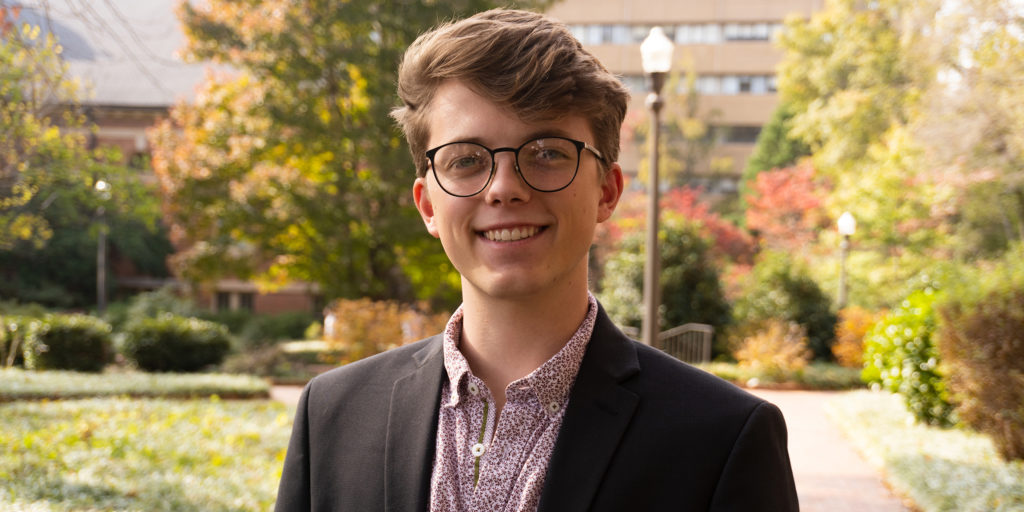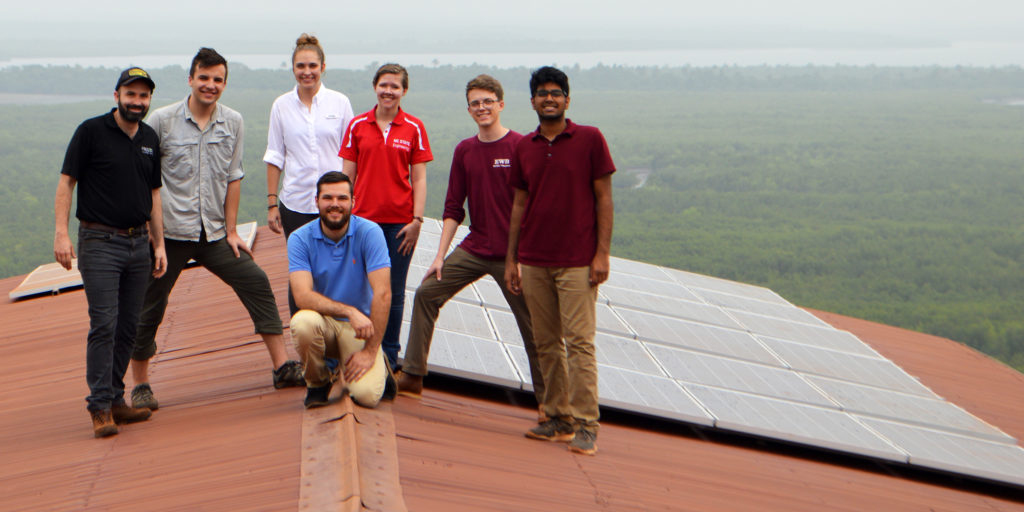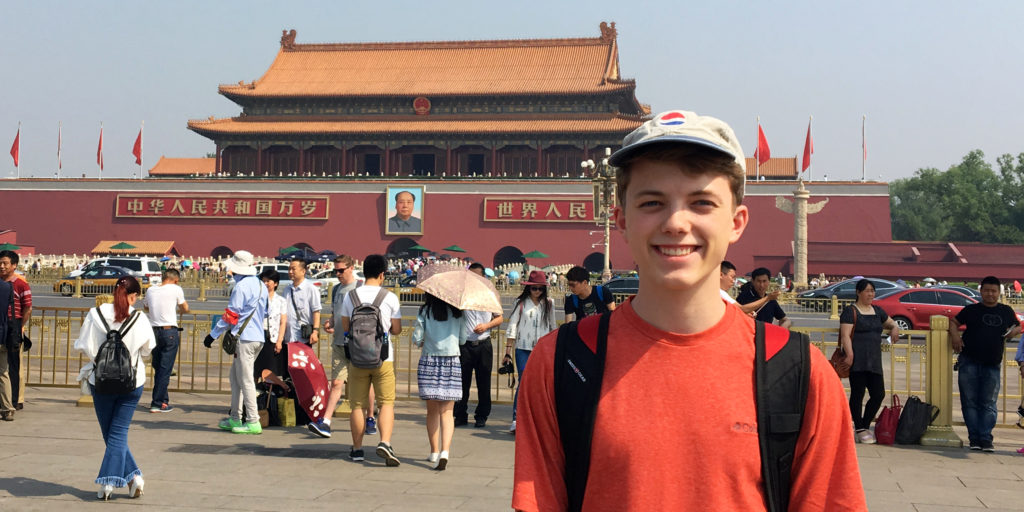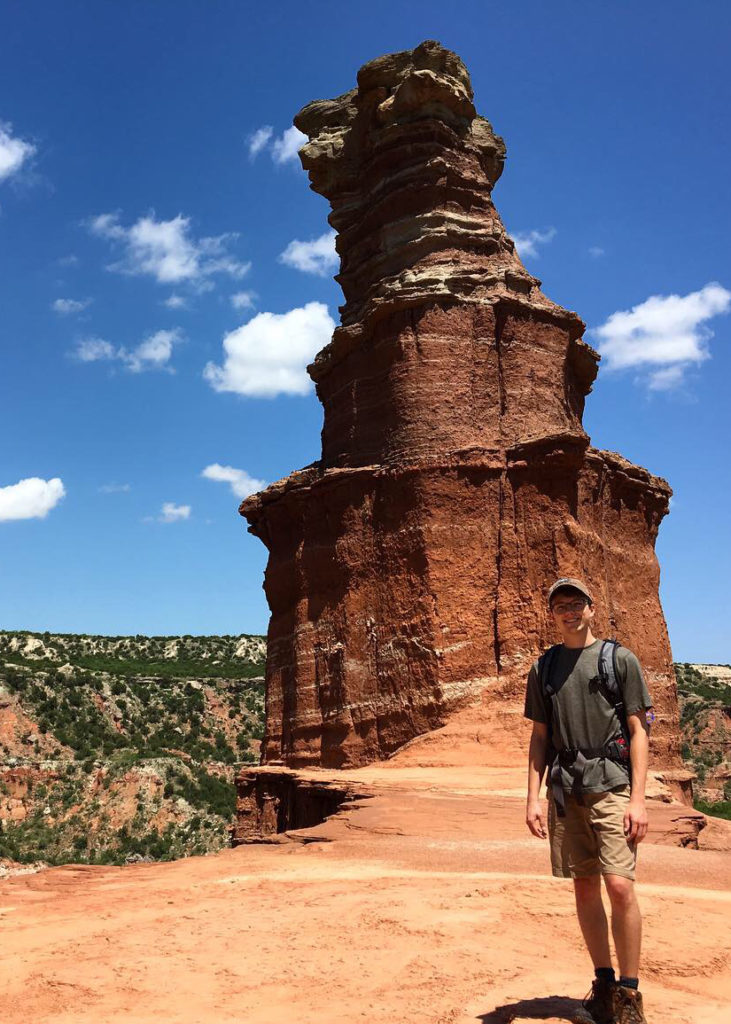
Evan Grant is a Park Scholar in the Class of 2020 studying mechanical engineering with a minor in art and design. He is originally from Sylva, North Carolina, and serves as a class liaison and co-chair of the Class of 2020 Distinguished Speakers Committee.
Since coming to NC State, the Park Scholarships program has provided me the resources to participate in experiences that would otherwise be unattainable and its emphasis on leadership training and character development has helped me become a more effective leader who accommodates many perspectives.
SERVICE
One of my most profound service experiences stemmed from my Civic Engagement Initiative (CEI), a year-long service project that forms a core component of the Park Scholarships program. Coming into sophomore year, I had expected to take on a CEI that aligned with my more technical interests like energy or housing.
My CEI ended up involving a close partnership with InterAct of Wake County, the only family safety and domestic violence center in the county. InterAct approached Park Scholarships to find student volunteers who could work directly with the children’s group in weekly meetings. I had never worked with kids. I did not consider joining the InterAct project until I spoke with the incredible woman who coordinates the children’s group and realized the need for positive male role models in the lives of these children. I immediately changed course and the decision resulted in one of the most rewarding and poignant service experiences of my life.
I felt extreme anxiety about working with children in the beginning, but I soon came to look forward to our weekly meetings. I felt energized by the family I was forming with everyone at InterAct. For an entire year, I worked with unbelievably resilient 5- to 7-year-old children, teaching and developing a curriculum about family safety, mental health, and nutrition. This provided a uniquely proximate view on an issue in my community and helped me further recognize my privilege. From this experience, I know that generating direct positive change in the lives of others will continue to guide my pursuit of knowledge and the way in which I engage with my communities moving forward.
CHARACTER
My undergraduate journey has been one of exploration in many areas and ultimately a deep involvement on campus and a strong connection with the Wolfpack community. One of the first clubs I joined upon coming to State was a hip-hop dance crew called The Production, which was actually led by another Park Scholar in the Class of 2018, Ashley Avis (née Lawson). Shortly thereafter, I also joined the NC State Chapter of Engineers Without Borders (EWB) and the Sustainability Stewards.
During my three years with EWB, I have served as a member of the team leading the design and implementation of a renewable energy project in Sierra Leone and have been the active project lead for the past three semesters. This past winter, I had the opportunity to lead the trip to complete the installation of a 7kW photovoltaic (solar) array on our partner school in Freetown. This international partnership had a profound impact on me, shifting the paradigm of service in my mind from prioritizing project completion to a more ethical mindset which first considers the people affected by service.

As I learned how to work with a community half a world away, I came to understand that my service is not my own. My team’s contribution is merely an important resource to help the community realize their goal of making a 21st-century education available for their children, and I feel deeply honored they entrusted us with such responsibility. In a few days, my team and I will leave for our final monitoring trip, the last stage of our project and our last visit to the school. We will perform maintenance and operations training, and then formally close the project, leaving the school with full autonomy and knowledge of their system which should provide reliable power for at least 20 years.
LEADERSHIP
My experience as a member of the Sustainability Stewards, a select team of dedicated student volunteers working for the Sustainability Office, has reaffirmed how essential communication and awareness are for affecting real change on important issues. I currently lead the Education and Outreach committee, and have directed days of service and reflection, hosted panels on intersectionality in the climate crisis, held discussions about environmental justice, and presented many times to various groups of my peers and community members. In each case, I have been responsible for distilling sustainability information into a compelling story that resonates with each new audience and tried my best to demonstrate the necessity for intersectional sustainability action.
NC State places great emphasis on being a leading sustainable institution and its efforts, such as financing an excellent Sustainability Office and seeking energy-efficient solutions, have increasingly involved students. I have personally presented to and met with the Chancellor regarding Stewards and campus initiatives, and will continue to be present in discussions about NC State’s sustainable future.
SCHOLARSHIP
In my summer months spent off campus, I have tried to simultaneously prioritize new experiences, travel, and educational advancement. Thus, I have participated in three excellent programs: study abroad in Hangzhou, China in 2017, biomechanics research in Rostock, Germany in 2018, and robotics research at Oregon State University in 2019.
Before I came to NC State, I had never even set foot on an airplane, let alone traveled to another country. Still, I had a deep urge to explore the world and learn about cultures different from my own. Naturally, I made a plan to travel as physically far from home as I could and enrolled in a summer program at Zhejiang University in Hangzhou, China. I want to stress that I do not come from an economic background where a trip like this is feasible. In addition to receiving some scholarships from the Study Abroad Office, I was also awarded a Park Enrichment Grant, which ultimately enabled me to take advantage of this life-changing experience without placing an excessive burden on myself or my family. Thus, for six weeks in the summer of 2017, I learned about circuits and Chinese energy policy while exploring the “Garden City” of China and meeting wonderful new people.

In 2018, I was accepted to the 10-week Research Internships in Science and Engineering (RISE) program offered through the German Academic Exchange Service. Through this, I joined the Department of Animal Physiology at Rostock University. Yes, despite my engineering background, I worked in a biology lab. I was curious about morphology, the study of how biological forms achieve and excel in their function. I view biological evolution as the world’s preeminent engineer and designer, whose work can yield insights for new technology that may advance humanity.
My research project involved designing an experimental apparatus and procedure to evaluate how naturally occurring wing damage in flies affects their flight characteristics. I constructed enclosures for the flies that recorded continuous audio over the course of several weeks, and periodically performed detailed assessments of individual wing damage. This opportunity allowed me to gain important lab experience and develop many technical skills, but it also taught me deeper lessons about working with a team outside of my normal discipline and how to effectively communicate science, even across a language barrier.

To keep my next experience relatively local, in the summer of 2019, I built a bed platform in the back of my car and embarked on a solo road trip to Oregon. Car camping each night, I spent about two weeks visiting cities and as many national parks as possible. I camped under the stars in a 30 square mile dune field, crossed frozen rivers leading to pristine alpine lakes, saw thousand-year-old trees, and ultimately hiked more than 60 miles.
However, this incredible experience was actually only my journey to another. I had been selected to participate in robotic research and design at an excellent REU program at the Collaborative Robotics and Intelligent Systems Institute at Oregon State University. I was brought on under Dr. Cindy Grimm and was tasked with developing the capabilities of a fully-actuated robotic hand for use in a series of automated grasping tasks. These tasks were designed to evaluate the feasibility and success rate of a variety of novel grasping strategies made possible by full actuation of each finger on the hand.
During my time there, I achieved a fully operational and responsive hand that is now being used by the lab for further experimentation, which I am partnering with remotely. We hope to be able to replicate grasps performed by human subjects using a poseable version of the hand and achieve high success rates in grasping and manipulation tasks not possible with underactuated hands or other end effectors. This experience reaffirmed a strong underlying passion for robotics and gave me the confidence to pursue a graduate degree in the field. I am now seeking a master’s degree in robotics with the hope of eventually developing better medical robotics systems.
Looking back, the Park Scholarships program has been instrumental to my successes through its continued support and guidance. I am so grateful for the entire office staff, my mentors Dr. Campbell, Dr. Griggs, Dr. Buckner, and Dr. Griffin, and the many Park Scholars who have entered my life over the past four years. With you all, I know I have a community and a sense of belonging that will persist throughout my entire life. Now in the final semester of my undergraduate career, I feel a sense of relief. I have grown so much as a member of the Park community, and I know I’m ready for what lies ahead.